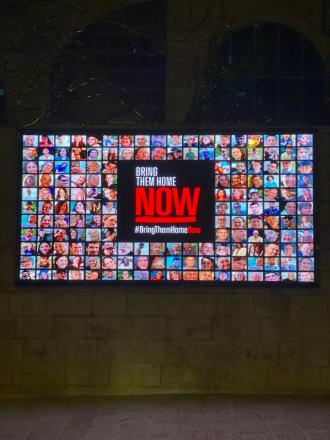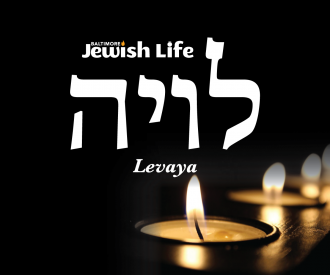Life is filled with disappointment.
Inevitably we each face loss of loved ones during our sojourn on this earth. We often must deal with the difficulties of infirmity or injury. The sudden twists and turns in daily life that disrupt our carefully organized plans and expectations certainly dampen our joy and sense of security on a regular basis. Financial struggle and loss too, is a recurring challenge. Even when life seems to be ‘traveling along’ fairly, the anxieties over when will the ‘ax finally fall’ on our party, permeate our sense of equilibrium constantly.
These trials in life prod frustration and doubt, leading us to question G-d’s interest in us at best, or His very existence at worst. Even those who remain steadfast in their faith often detour into dangerous self-recrimination and lack of self-worth, descending into depression and despair.
The Holy Izhbitzer fascinatingly observes how the first five subjects discussed in our portion reflect directly upon these daily stressors.
A kohen despite his noble calling must deal with the loss of those relatives closest to him. His personal trauma is intensified as he generally must keep away from contact with the dead, with this being his first encounter ‘face to face’ with death. The Kohen Gadol has an additional challenge as he must refrain not only from contact with his dearest departed ones, but he must also remain on duty in his regular schedule at the Temple, being denied the ability to mourn and benefit from its cathartic process. It’s not fair!
The next discussion relates to a kohen who develops a blemish that disallows him from serving in the Temple. Imagine his anguish in realizing that although he may still partake from the holy portions gifted to the family of kohanim, he is now prohibited from ever serving again in any real capacity. His entire life’s mission as a member of that special cadre, the descendants of Aharon, privileged to represent the nation and access a closeness to the Hashem that is denied to non-kohanim, is now abruptly stifled. It’s not fair!
The Torah then discusses the restrictions placed upon a kohen who becomes tamei, ritually impure, who despite his evident preparedness and zeal to serve, unintentionally encounters some tumah, impurity, that painfully quashes his excited and ambitious devotion, now preventing him from entering into the Temple and partaking in the consumption of the priestly gifts. Why has G-d brought this upon him, he wonders, after all, didn’t he push himself to the limits of commitment only to discover ‘pie in the face’? It’s not fair!
The next subject relates to an individual who generously seeks to offer from his bounty of cattle and flock as loving offerings to G-d and discovers blemished animals that are disqualified from being accepted as offerings. He too, reflects on the injustice of his being encumbered with maimed and deficient animals when he so strongly desired to elevate his holdings by contributing so magnanimously to the Temple only to find himself rejected in his quest. It’s not fair!
Lastly the Torah speaks about an individual who desires to bring a thanksgiving-offering, with the Torah limiting its consumption to merely one day, in contrast to other similar peace-offerings that may be eaten over a two-day period. The Izhbitzer asserts that this restriction intimates an important message to the bringer of this sacrifice. Don’t wallow in your joy for more than one day for tomorrow there is no guarantee it will continue. Today you must celebrate but never take for granted that it will endure. One must already cry out today, whilst he yet regales over G-d’s benevolence, for the success of the morn to be assured. This message can be quite distressing. You mean I must live with anxiety from day to day never feeling confident that even the very next day’s happiness is not vouched for? It’s not fair!
So how do we overcome these stressors that keep our stomachs in knots?
The antidote is found in the five Yomim Tovim, festivals, we celebrate yearly which appear directly after these five portions. But it begins with the Torah first reiterating the celebration of the day of Shabbos, during which we recite the psalm King David composed, a song for the Shabbos day, reminding ourselves, It is good to thank Hashem, and to sing praise to Your Name. We are taught that this refers to the Shabbos in the World to Come, when we will perceive with utter clarity the goodness, He showered upon us even while we thought we were suffering. Our Shabbos is merely a semblance of that great day, and here we are yet unable to fathom His benevolence fully.
The strength to deal with these ‘unfair’ situations in life, while our vision is obscured, is drawn from the five festivals enumerated here that mirror solutions to each of these challenges, inspiring us with the tools we need to quash our anxieties.
Pesach teaches us how G-d infused us with life, reviving us from near extinction, setting us on a journey that continues throughout the ages until we will arrive at our final destination. Death is an interval and a dot on the graph of eternity, that is only temporary. Real life never ends and although we take leave from our loved ones, we continue in their path to meet up once again when we fulfill our mission as a people. Life is fair!
At the giving of the Torah on Mount Sinai all the crippled and infirm were healed. In a world, post the sin of the Golden Calf, where we must still endure illness and death, the antidote to avoiding frustration from this reality lays in the fact that each one of us is defined by the Torah that speaks to us not only collectively, but individually as well. Every one of our circumstances in life were uniquely crafted to bring out our personal greatness. When we implement the Torah’s precise guidance for every given situation in life we face, we realize that our deficiencies were specifically orchestrated so that we may become truly ‘whole’ and complete. Life is fair.
The greatest tumah, is the impurity that stems from depression. We get depressed when we feel isolated and neglected. The situations in life that seem so random and in conflict with our greatest efforts to connect with G-d, are merely illusions and distractions. G-d is ever present and beside us, we just must open our ears to hear His call, His voice. The voice that emanated from Sinai is constant. The Shofar of Rosh Hashana is the ‘sound machine’ that cancels out all external noise, attuning our ears to the whispered breath of G-d that continues to encourage us lovingly at every point in life. Life is fair!
On Yom Kippur we take a break from the shackles of our material bodies and needs, transforming ourselves into virtual angels. The physical world is merely the playing field where we discover our true essence, our deeper souls. It is not what we can physically offer in tribute to the Almighty that defines us as much as it is the yearning for closeness which can be achieved absent of any material offering. Life is fair!
Finally, the holiday of Sukkos teaches us that we ride upon the proverbial shoulders of our father every moment of our lives. When we commemorate the actual Clouds of Glory we are declaring an awareness of His protection even when those clouds are invisible. In that reality there is no room for worry. Each day in the embrace of G-d infuses us with the security resembling that of a child in the womb of its mother, who simply senses it is being nurtured and cared for, with nary a fear or worry. Life is fair!
The Torah perhaps taught us this vital lesson in the context of the exalted and exceptional family of the kohanim to emphasize that no matter where one finds himself on the ladder of achievement, we all face moments of stress, confusion and fear. No one is excluded from these tests of faith.
So the next time you faces the pain of loss soothe the wound in the knowledge that it is merely an interval and the journey continues.
When you feel shortchanged by your limitations remember in overcoming those insufficiencies lay your perfection.
When tootling down the road of life you get a flat don’t forget G-d is right there next to you changing the tire.
When you feel down by the inability to contribute due to a lack of resources realize that your frustrated yearning is more valuable than the fattest offering.
When you fret over what the next day may bring, visualize that no matter what that may be, you will be sitting confidently on your Father’s shoulder.
באהבה,
צבי יהודה טייכמאן














